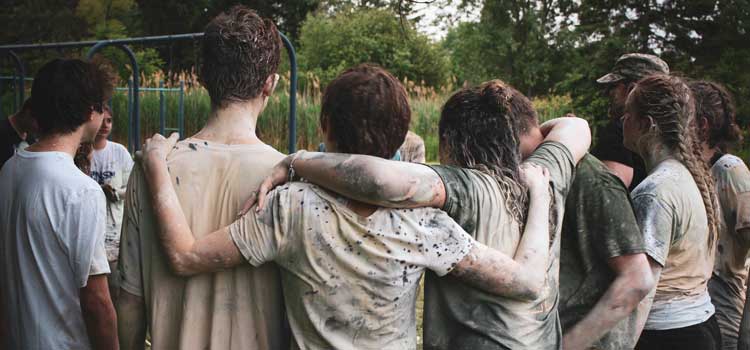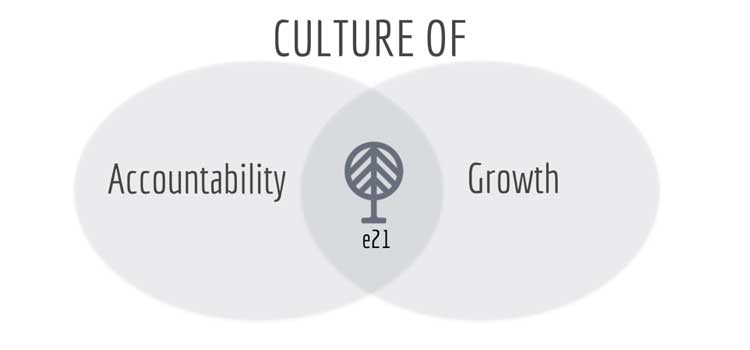Summer camp is a balancing act for camp directors. You have to create an atmosphere where kids can have fun and learn important skills, and you have to level up your staff experience to encourage positive growth and professional development.
Helping camps develop a system to create an empowered camp staff is what drove Scott Brody, Sarah Silverberg, and Daniel Shore—three experienced camp professionals—to create e21, a comprehensive set of tools and processes for camp leaders to level up their staff experience.
The e21 system builds over time and includes these approaches:
- Set clear expectations
- Create a culture of accountability
- Find opportunities for growth
- Build a great staff experience
- Emphasize the professional value of working at camp
Your staff deepens your camp’s values, they uphold your traditions, and they maintain the standards that attract campers, both old and new, summer after summer. When you take time now to incorporate a few of these tips from the e21 approach, you can level up your staff experience to make summer a success—and that means everyone wins.
Tip 1: Setting Expectations Around Expectations

Most camps do a good job of setting expectations before summer begins. e21 takes this a step further and encourages camps to set agreements with their staff about what happens if expectations are or are not met.
Start by thinking about performance management before counselors are hired. If you set expectations early, these can be built into the marketing and interview process. The end result will be a team that already understands and embraces these expectations.
e21 also suggests that camps view expectations through a lens of mutual accountability rather than traditional, top-down performance management. In this way, you communicate to staff both what is expected of them AND what staff can expect from you and other leaders.
This clarity is important because it shows that you’re a fair and consistent leader, giving you buy-in from your team, no matter their role.
Tip 2: Level Up Your Staff Experience with a Continuous Review Process

Camp is an incredibly short yet dynamic period of time. e21 encourages camps to not wait for formal review events (such as a mid-summer review), and instead embrace a more fluid approach to feedback.
One suggestion is to hold weekly check-ins with each counselor. Your first instinct might be to say that you don’t have time or capacity for this process, but even a simple feedback form with a shortlist of yes-or-no questions will suffice. As the forms roll in, you can flag any issues that come up, which can aid how you work with each staff member over the course of a summer or session.
This process helps you understand where your counselors are excelling, and where there’s room for improvement. It also gives them a consistent and welcoming way to communicate with you.
This approach works both ways. It takes the burden off staff to try and find a time and a way to tell you what they need you to hear. It also means you won’t feel overwhelmed with ad-hoc check-ins happening when you have other tasks to complete, and that you don’t have to invent a new process for addressing challenges or encouraging growth with each counselor time after time.
Camp is an incredibly short yet dynamic period of time. e21 encourages camps to not wait for formal review events (such as a mid-summer review), and instead embrace a more fluid approach to feedback.
Tip 3: Make Camp Professional and Fun Simultaneously
When incorporating tips like these from e21, you might worry that it will make camp feel too rigid. In reality, these systems can give your counselors a way to validate the work experiences they’re having as camp staff, and understand how camp jobs can contribute to their overall professional skill set.
There’s immense pressure on college-aged applicants to reject camp jobs in lieu of what they might consider more professional internships. Camp, according to e21, is the ultimate internship. Camp jobs create future workers who are not just academically qualified, but also have interpersonal skills—the stuff you can’t quantify with degrees or GPAs.
Your role as you aim to level up your staff experience is to keep camp fun and simultaneously articulate the professional value of camp jobs, which your counselors can then convey to their future employers. When counselors feel that they are consistently growing and learning new and widely applicable skills, they’re driven to return, which means you’re not hiring a completely new team every summer. Retention is the magic word here.
Being a camp counselor can be the most fun job ever and it can also be an opportunity to develop career-building professional skills.
Tip 4: Use Data to Improve Your Recruiting Process

The e21 team knows that you’re often focused on the immediate need for hiring. As you fold these initial three suggestions into your processes for the first time, their hope is that you can build on that experience when recruiting for summers going forward.
Setting expectations, and using them as the basis for a consistent review process during summer, will create a ton of valuable data. This information can guide your hiring and recruitment process moving forward when you have more time to build systems that will level up your staff experience. For example, if your counselors report high satisfaction with their summer jobs, you can present this information to new counselors in the interview process. It might be the detail that pushes your must-have candidate toward a camp job if they’re considering more than one offer.
These data are also helpful during the re-hiring process. Instead of going with your gut, or with random stories and anecdotes, you have real data from weekly reviews to guide decisions about which counselors to bring back.
Time to Get Started

A happier work environment is good for your staff, and there is no question that when you level up your staff experience it deeply benefits campers as well. It’s why we approach employee engagement and performance management in a similar way at CampMinder. Driven by our six core values, we know that staff engagement and support help us better serve our clients.
These tips from the e21 team are part of an entire ecosystem built to help you maintain your magical camp culture and give kids unforgettable experiences each summer. Nothing they suggest will change what makes your camp special. Instead, they guide you through a process to better empower staff at camp, built around cultivating accountability and growth.
Meet the e21 team:
Scott Brody is a camp owner, educator, and thought leader – both in the summer camp industry and the wider areas of 21st Century Learning, Workforce Development, and Child Development.
Sarah Silverberg is the Director of Operations for Camps Kenwood & Evergreen. She has spent 16 years in the camp world in operational roles creating supportive and high-performing work environments.
Daniel Shore, or Shore, has a Ph.D. in Workplace Psychology and has spent 14 summers working at and consulting for camps on staff leadership and development.
Visit http://www.e21.org to learn more.
